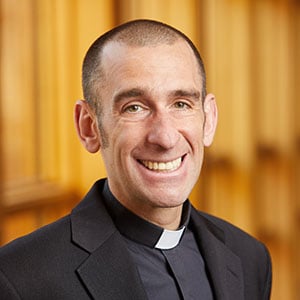 About a month ago, on one of the coldest and windiest days of the season, a student and I went for a long run. We are both preparing for spring marathons. It was an out and back route, with a climb up and along the ridge of West Rock, a crushing—then gradual—downhill to the half-way/turnaround point on a golf course. Out there in the open, there was no hiding from the brutal wind blowing at twenty-one miles per hour with a one-degree chill that cut straight through us. With a steep climb and 7.5 miles to go, although we were silent and taking things in stride, I’m sure that we were both praying to God with that raw kind of prayer that comes from an immediate awareness of the stark conditions that we are facing, our own capacity to withstand them and of our need for God to fill in where human frailty falls short.
About a month ago, on one of the coldest and windiest days of the season, a student and I went for a long run. We are both preparing for spring marathons. It was an out and back route, with a climb up and along the ridge of West Rock, a crushing—then gradual—downhill to the half-way/turnaround point on a golf course. Out there in the open, there was no hiding from the brutal wind blowing at twenty-one miles per hour with a one-degree chill that cut straight through us. With a steep climb and 7.5 miles to go, although we were silent and taking things in stride, I’m sure that we were both praying to God with that raw kind of prayer that comes from an immediate awareness of the stark conditions that we are facing, our own capacity to withstand them and of our need for God to fill in where human frailty falls short.
“Now help me, who am alone and have no one but you, O LORD, my God.” Queen Esther, the heroine of today’s first reading from the Book of Esther, “which tells a story of the deliverance of the Jewish people” (New American Bible notes), prays this prayer as she prepares to risk her life for the salvation of her people. The faith that she held since she was a young Jewish girl named Hadassah, an identity she has hidden in order to infiltrate the court of the Persian emperor Ahasuerus, came through and expressed itself so purely in her prayer for her people: “Now help me, who am alone and who have no one but you.” Suddenly “God of Abraham, God of Isaac and God of Jacob” becomes “My God,” to whom she turns in her hour of need.
Esther's faith journey is perhaps not unlike our own. Perhaps sometimes we are comfortable, keeping God up there or over there at a distance; keeping our faith hidden deep down inside, just enough so that it would not demand too much of us. But when do we finally turn to God without reserve? Maybe it wasn't until we experienced loss or hardship—when we were afraid, or lost, or anxious for ourselves or someone we love. Maybe it wasn’t until we felt in our bones that raw need for divine grace to get us through the brutal, icy wind. Or, maybe it wasn’t until we needed a boost of courage. When we need that boost of courage, that suddenly, in an hour of need we turned—finally—to God. There and then, we turn to God, who has been patiently waiting for us, and cry out: “Now help me, who am alone and have no one but you, O LORD, my God.” In that moment, in our hour of need, we do not hesitate for an instant to call upon “My God.”
And God answers. In the Gospel, Jesus tells us to “ask and it will be given to you; seek and you will find; knock and the door will be opened to you.” We remember, as we pray in Psalm 138: “Lord, on the day I called for help, you answered me.” God has been there for us before. God is here for us NOW.
We are nearing the end of the first week of Lent. As we face our own limitations and frailties, let’s release those things that keep us from trusting entirely in God, and, from striving to love God and others as we were made to do. Perhaps we might let Esther's prayer be ours today: “My God, help me who am alone and have no one but you.” We pray it not only for ourselves, but also for the lonely, the orphaned, the abandoned, the sick, the suffering, the fearful, the mourning and the lost. We pray it for our brothers and sisters and for the most vulnerable among us, especially those who are literally left out, alone, in the cold, icy wind. And may we also add: “O Lord, Our God, help us to give to those who ask, to be light for those who seek, to open the door to those who knock.”

 Fr. Ryan Lerner, Chaplain
Fr. Ryan Lerner, Chaplain


